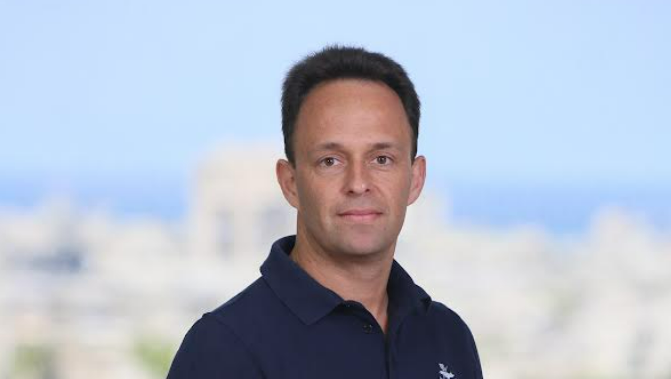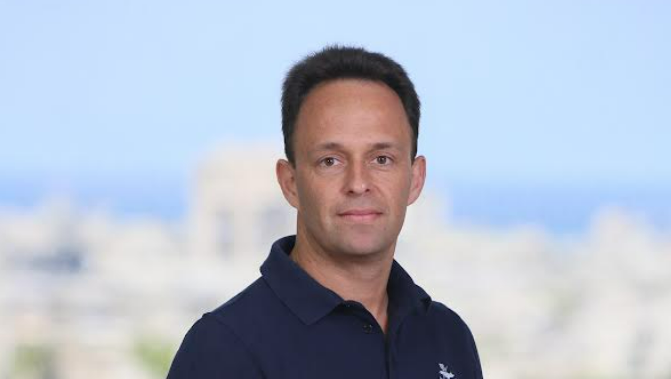
HR in War
“The massacre in southern Israel has awakened anti-Semitic voices throughout the world.”
Yoni Shtein, co-founder and CEO of Laguna Health, discusses the importance of leadership in times of crisis in Israel and overseas.
“The way we see it, maintaining a strong Home Front is part of our company's contribution to society,” said Yoni Shtein, co-founder and CEO of Laguna Health. “Entrepreneurs and managers play a fundamental role in establishing a strong Home Front by employing individuals and, as a result, they help society.”
HR in War is a new series exploring how companies in Israel are adapting in unusual times. At CTech we believe the world should know about the atrocities committed on 7/10 while at the same time highlighting the continued resolve and resistance of the Israeli tech ecosystem.
“The massacre in southern Israel has unfortunately awakened anti-Semitic voices and actions throughout the world,” he continued. “Different leaders chose to express their positions or remain silent. What you do is who you are and one must not allow doubt to creep in on days like this - one must both do and stand for their morals. Moral clarity has never been in scarcer supply. To be a leader is never easy, especially in times like these. And yet the importance of standing for our values is equally consequential. We wear our values on our sleeves and post our views on various platforms.”
Company name: Laguna Health
Your name and title: Yoni Shtein, CEO and co-founder of Laguna Health
Names of founders and upper management: Yoni Shtein and Yael Peled-Adam
Field of activity: Healthcare
Number of employees: 25
Office location: Ramat Gan
On a scale of 1-10, how much did the war disrupt operations at the company?
Four. I am typically cynical about the "business as usual" posture or mentality in usual times, especially if we're talking about startups, and even more so in unusual times. I’m cynical because I see a lot of strength in startups’ ability to constantly adapt to a challenging reality on a routine basis, in their ability to operate in a dynamic environment that they cannot control, in order to win. So then of course I’m all the more cynical when I hear that business is as usual in such an unusual period like the one we are in right now.
The way we see it, maintaining a strong Home Front is part of our company's contribution to society. Years ago I served in the military in a combat role, and it has since been ingrained in me that this is the most effective way to contribute to my country. That said, I also realize that there are many other meaningful ways to contribute to this cause. Entrepreneurs and managers play a fundamental role in establishing a strong Home Front by employing individuals and, as a result, they help society.
What consequences have you experienced from these disruptions?
Naturally, the first week was filled with shock and sadness for all of us. We needed time to digest the events, prioritize employees' well-being, and better understand the situation. Towards the end of the week, we realized that we were entering a protracted period of uncertainty and devised a matching business continuity plan. This plan supports our employees on the one hand and ensures the continuity of our services to our customers and partners on the other. Currently, we're making longer-term plans and scenario planning. This unfolding tragedy has affected company operations, but as Israelis and entrepreneurs, we have muscle memory helping us to adjust rapidly to change.
What are the two major challenges you are coping with these days?
There are two main challenges facing the company at present: drafting of military reserve personnel and travel disruptions. As an early-stage startup, every employee's absence is felt. Obviously, we support the employees who were drafted to the reserves as well as their families. We do so by redistributing their tasks among the remaining team members.
Separately, air travel was significantly affected with most international airlines canceling their flights to and from Israel. To maintain business continuity, we decided that Yael Peled-Adam, co-founder and CPO of Laguna, would stay in Israel, whereas I would travel to work from the U.S. This has allowed us to be in close proximity to our customers, travel freely when needed, and maintain a high level of product and engineering delivery.
What support do you provide to employees?
We place a high priority on our employees. Normally, the company has a variety of stakeholders e.g., our customers, investors, employees, etc., who require attention and balance. When there's an emergency, our employees' physical, mental, and emotional well-being comes first. Yael and I support our employees in any way we can. We have decided in Laguna to immediately switch to working from home until further notice (at the same time, we have opened our Laguna office to civilian war rooms). Also, it's critical to show a deep understanding and flexibility around in-person presence in conversations and meetings and to work asynchronously as much as possible. We communicate with employees every day because their physical and mental states can change constantly.
Do you have employees with foreign citizenship who asked to work from another country? If so, has movement been requested/approved?
As of this writing, we have not received any requests for relocation.
Startups only: How do you communicate the situation to investors, and how are they reacting?
During such a period, the importance of business continuity planning communication with employees, investors, and customers cannot be overstated. As a business, we should prepare for the unexpected, yet there are some things that are truly unexpected, such as war. The more extreme the scenario, the greater the importance of management planning and robust communication with various stakeholders.
On the first day of the inferno in the south of Israel, we sent an email to all investors and checked in with all employees 1x1. Additionally, Yael has maintained daily contact with all of our Israeli employees as well as international employees, whereas I keep investors and clients updated. It's important to communicate on routine days and critical during emergencies. Our customers and investors have expressed a great deal of support for the company and Israel.














